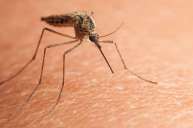Four towns in the Northeast are under lockdown thanks to a mosquito born disease. These Massachusetts towns went under voluntary evening lockdown. This is an attempt to limit the spread of a potentially fatal disease.
The four towns are Douglas, Oxford, Sutton, and Webster. Recently, the Massachusetts Department of Public Health (DPH announced it had its first case of Eastern equine encephalitis. It's the first time the state has seen the disease since 2020. As part of the lockdown, officials are urging people to stay indoors starting at 6:00 p.m.
After October 1, they'll push it back to 5:00 p.m. This will last until the first hard frost of the season.
"It is the Board of Health's responsibility to protect the public health. And we take EEE very seriously. And we are strongly encouraging residents to follow these recommendations due to the severity of EEE and the fact that it is in our community," a spokesperson for the town of Oxford said via New York Post. "So far this year in Massachusetts, there has only been one human case of EEE. But throughout the state, mosquitoes have tested positive for EEE."
Mosquito Born Disease
According to officials, the lockdowns are a recommendation. They won't be enforced. "We want to educate our residents about EEE and the seriousness of the illness and make them aware of the risk," the statement also continued. "However, if they want to use town fields outside these recommendations, they will have to show proof of insurance and sign an indemnification form."
The mosquito virus causes a host of symptoms including fever, seizures, diarrhea, and drowsiness. It can be fatal with 30% of people dying. Symptoms appear between five to 10 days after a mosquito bite.
"Eastern equine encephalitis can cause brain infection (encephalitis), which can be fatal," Edward Liu, MD, chief of infectious diseases at Hackensack Meridian Jersey Shore University Medical Center, said. "While evening lockdowns could be protective, other options would be educating the public of the risk, encouraging mosquito repellent usage, and spraying to prevent the prevalence of mosquitoes."
So far, there's no treatment.
"These viral encephalitides have no treatment, so prevention and supportive care is the only course of action," Liu noted.




